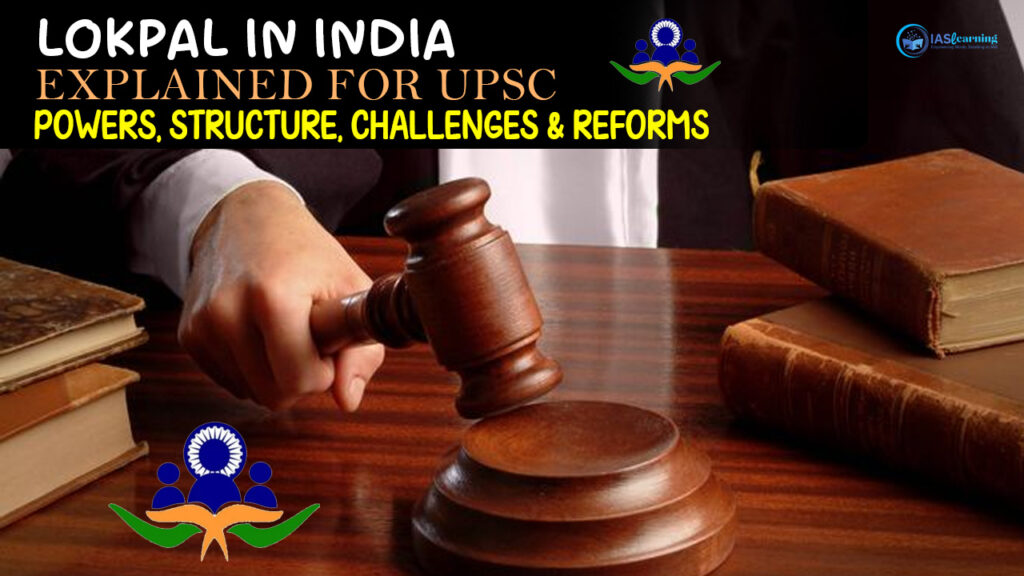🔰 Introduction
Corruption in public life erodes governance and citizens’ trust. To combat this, India enacted the Lokpal and Lokayuktas Act, 2013, setting up a national-level anti-corruption ombudsman called the Lokpal. This blog post explores all aspects of Lokpal from a UPSC exam perspective.
🧾 Background of Lokpal in India

- The term “Lokpal” was coined by Dr. L.M. Singhvi in 1963.
- Based on 1st Administrative Reforms Commission (1966) recommendation.
- The Lokpal Bill was introduced 8 times in Parliament between 1968–2011 but lapsed.
- Civil society movement led by Anna Hazare (2011) brought public pressure.
- Finally, the Lokpal and Lokayuktas Act was passed in December 2013 and came into force on 16 January 2014.
⚖️ Salient Features of Lokpal and Lokayuktas Act, 2013
✅ Composition:
- 1 Chairperson + Maximum 8 Members
- 50% Members must be judicial
- 50% must belong to SC/ST/OBC/Minorities/Women
✅ Eligibility:
- Chairperson: Former Chief Justice of India / SC Judge / Eminent person
- Judicial Members: Former SC Judges or Chief Justices of HCs
- Other Members: Eminent persons in law, vigilance, anti-corruption
🔍 Selection and Appointment
🏛️ Selection Committee:
- Prime Minister (Chairperson)
- Speaker of Lok Sabha
- Leader of Opposition (Lok Sabha)
- Chief Justice of India / SC Judge
- An Eminent Jurist (nominated by President)
A Search Committee shortlists names for final selection.
👥 Jurisdiction of Lokpal
The Lokpal can investigate allegations of corruption against:
- Prime Minister (limited exceptions)
- Union Ministers & MPs
- Group A–D officers
- PSUs and Autonomous Bodies
- NGOs receiving:
- ₹1 crore+ from Govt OR
- ₹10 lakh+ from foreign sources
🛠️ Powers & Functions
- Inquire into offences under Prevention of Corruption Act, 1988
- Order CBI inquiry/investigation
- Power to:
- Seize assets, issue summons
- Recommend disciplinary action
- Launch prosecution
- Power to act against whistleblower victimisation
⚠️ Exemptions
- Lokpal cannot inquire into matters:
- Related to international relations, national security, atomic energy, unless 2/3rd full bench approves.
- Parliamentary speeches/votes of MPs are excluded.
📌 Comparison: Lokpal vs Lokayukta
| Feature | Lokpal (Centre) | Lokayukta (States) |
|---|---|---|
| Enacted by | Parliament | State Legislatures |
| Jurisdiction | Central Government officials | State Government officials |
| Mandatory | Yes | Yes (under 2013 Act) |
| Status | Constituted in 2019 | Still pending in many states |
🧩 Issues and Challenges
| Challenge | Explanation |
|---|---|
| ❌ Delay in Appointment | First Lokpal appointed only in 2019 |
| 🧑⚖️ Vacancy | Lokpal chairperson post vacant since 2022 |
| 📊 Lack of Suo Motu Powers | Cannot act without a formal complaint |
| 🧾 NGO Clause Dilution | Original strong provisions diluted in 2016 |
| 🧍♂️ Lack of Awareness | Common citizens are unaware of filing process |
| 🏛️ Limited State Action | Many states still don’t have Lokayuktas |
🛠️ Reform Suggestions
- Fill Lokpal vacancies immediately
- Give suo motu powers
- Empower independent prosecution wings
- Make Lokayuktas mandatory in all states
- Publish annual performance reports to Parliament
- Create a digital complaint platform accessible to all
🧠 Trick to Remember: PM JAM Comes Under Lokpal
- P – Prime Minister
- M – Ministers
- J – Judges (post-retirement in selection)
- A – All Public Servants
- M – MPs (with limits)
📚 UPSC Prelims PYQ (Previous Year Question)
UPSC Prelims 2020 Q:
With reference to Lokpal, consider the following statements:
- In India, the office of the Lokpal is created by an amendment of the Constitution.
- The Lokpal does not have jurisdiction over corrupt acts of MPs and Ministers.
Which of the statements given above is/are correct?
A. 1 only
B. 2 only
C. Both 1 and 2
D. Neither 1 nor 2
Consider the following statements about Lokpal:
I. The power of Lokpal applies to public servants of India, but not to the Indian public servants posted outside India.
II. The Chairperson or a Member shall not be a Member of the Parliament or a Member of the Legislature of any State or Union Territory, and only the Chief Justice of India, whether incumbent or retired, has to be its Chairperson.
III. The Chairperson or a Member shall not be a person of less than forty-five years of age on the date of assuming office.
IV. Lokpal cannot inquire into the allegations of corruption against a sitting Prime Minister of India.
Which of the statements given above is/are correct?
(a) III only
(b) II and III
(c) I and IV
(d) None of the above statements is correct
✍️ UPSC Mains Practice Questions
GS Paper II:
1. Despite being hailed as a milestone anti-corruption legislation, Lokpal has failed to meet expectations. Discuss with reasons and reforms. (250 words)
GS Paper IV (Ethics):
2. Lokpal represents the institutionalization of ethics in governance. Explain with examples the significance of independent oversight bodies in maintaining public accountability. (150 words)
📌 Conclusion
The Lokpal institution is a critical pillar in India’s fight against corruption, but operational gaps and political reluctance have weakened its potential. With judicial backing, civil society push, and systemic reforms, Lokpal can truly become the watchdog the nation needs.
